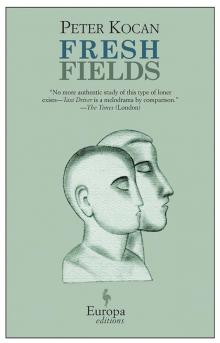Read Fresh Fields Storyline:
"A stark, harrowing, yet deeply courageous work of immense power and magnitude."-QuadrantHomeless and alone, a disturbed youth drifts between town and the Australian Outback, growing increasingly isolated and distrustful in a society lacking the means and seemingly the will to help him. He is coerced by strange voices and haunted by a history of family violence. This compelling coming-of-age novel tells Peter Kocan's own story, offering us an intimate portrait of the dark forces at work in the evolution of a loner. "No more authentic study of this type of loner exists," wrote The Times, naming Fresh Fields book of the year in 2005. "Taxi Driver is a melodrama by comparison."From Publishers WeeklyStarred Review. Australian writer Kocan, who spent 10 years imprisoned for attempted murder, unflinchingly renders the isolation, grief and longing of a troubled outsider in this dire, semiautobiographical novel. Having fled a violent home with his mother and younger brother, an unnamed 14-year-old soon finds himself on his own. He drifts between Sydney and brief jobs in the bush, often lost in the expanses of his mind. He pours his heart into the objects of his imagination, including Grace Kelly, whom he calls "Sweetheart," and Diestl, who is probably Marlon Brando's character from The Young Lions (Brando plays a young Nazi officer who wanders alone through the French countryside after Germany's WWII defeat). "The youth" identifies painfully with Diestl. And whether abusive, careless or sympathetic, the various adults that pass in and out of the youth's life fail to draw him into any community: his sense of the world as lacking promise becomes increasingly justified. Nevertheless, Kocan indulges in neither sentimentality nor rage, and his unnamed protagonist's story is a fine achievement. As the young man descends into madness, "the Diestl mood" becomes more and more pronounced; by the end Diestl seems to speak to the youth. Here and throughout, Kocan writes clearly and beautifully. (May) Copyright © Reed Business Information, a division of Reed Elsevier Inc. All rights reserved. ReviewIn Kocan's latest bleak novel (The Treatment and the Cure, 1985, etc.), a teenager, down and out in Australia, is sustained by his fantasies.Three people arrive at the train station of a large city: The woman, the youth and the boy. We don't know their names, nor that of the city. They are fleeing Vladimir, an abusive husband and father. The 14-year-old youth knows he doesn't have the will to fight him. What inner strength he has derives from Diestl, a German soldier in a war movie. The Germans have lost, and Diestl is on enemy terrain, but he still has his Schweisser sub-machine-gun. Diestl the self-reliant loner consoles the youth through thick and thin. The youth gets a job in the country, on a sheep ranch, while his mother finds work elsewhere upstate. He's a slow learner, and his boss is short-tempered; he's fired. He doesn't fare any better on a wheat farm, or as a cleaner at a movie theater (let go because he smells bad). Daytimes he's in parks or visiting museums; some nights he finds crummy hotels, others he sleeps on the street. His thoughts revolve around Diestl, the Anglo-Saxon King Harold (another outnumbered hero) and pin-up Grace Kelly. He cries a lot - the least thing sets him off - and he's never had a girlfriend. There are opportunities to explore his sexuality (with a girl on the wheat farm, with some gay guys he meets while clipping cotton), but Kocan's not interested in that coming-of-age story. That wouldn't matter if he replaced it with something else, but he doesn't, so we get a slow fizzle. One fellow lodger says the youth is "a young tiger that doesn't know whether to hide or kill," and the youth does buy a rifle, but Kocan, who in 1966 attempted to assassinate an Australian politician and subsequently spent time in a hospital for the criminally insane, must have a problem imagining his crybaby pulling the trigger, for he leaves everything up in the air. The youth doesn't have the spirit to carry this tale of woe. (Kirkus Reviews)Pages of Fresh Fields :
